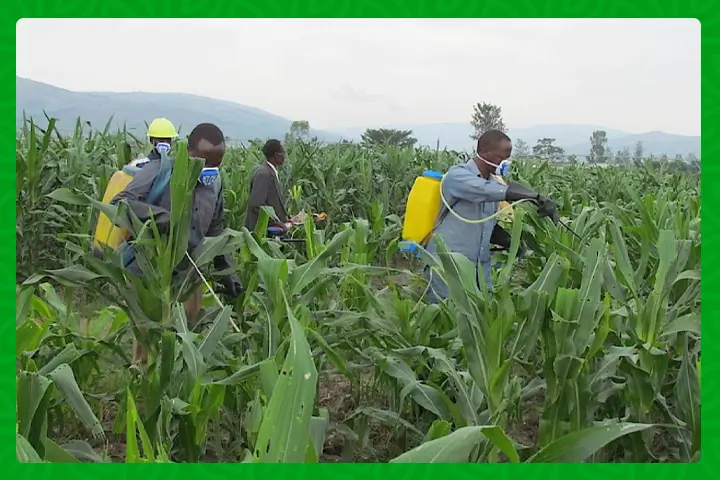
Rwanda’s maize farmers are facing a formidable adversary as they prepare for Agriculture Season 2024 A. The fall armyworm, a relentless insect pest that feasts on more than 80 crop species, including maize, has developed a worrying resistance to pesticides. As the farming season gains momentum, the concern among farmers is palpable.
An Unyielding Foe
Despite the government’s efforts and the deployment of various pesticides, farmers are reporting that the fall armyworms are becoming increasingly resistant. Evariste Tugirinshuti, the president of Rwanda Maize Farmer Cooperatives Federation, pointed out that when pesticides are applied after the armyworms have already attacked maize crops extensively, they prove ineffective. To combat this, farmers have decided to adopt an early-stage approach, applying pesticides when the pests have not yet infested the maize plantations on a large scale.
The impact of fall armyworms in Agriculture Season 2023 A was exacerbated by dry spells. Members of COOPROMASA, a cooperative in Gatsibo District that cultivates maize and soybeans, reported using Rocket pesticide, but the armyworms remained resilient. These resistant pests have been a cause of concern, with some farmers experiencing losses ranging from 20% to 40% of their produce in the previous season.
A Glimmer of Hope with the Rain
Farmers are cautiously optimistic that with the arrival of rains, the impact of the fall armyworms might be less severe this season in some areas, such as Kirehe District. However, challenges persist in other parts of the country.
RAB’s Insights on Armyworm Resistance
According to the Rwanda Agriculture and Animal Resources Board (RAB), an assessment of existing pesticides must be carried out to address the issue of resistance. Athanase Hategekimana, in charge of combating crop diseases and pests at RAB, advised farmers not to rely on a single type of pesticide continuously. Instead, he recommended alternating between different types of pesticides to prevent the development of resistance. These strategic pesticide rotations can be instrumental in curbing armyworm infestations.
A Multi-Pronged Strategy
RAB emphasizes the importance of good agricultural practices on the 260,000 hectares to be planted with maize across the country. In addition to pesticide rotations, some farmers are advised to use traps for armyworms, particularly in regions with recurrent infestations.
In 2018, the Food and Agriculture Organization (FAO) distributed pheromone traps and lures to affected districts in Rwanda. These traps target male moths, disrupting the reproductive cycle of the fall armyworm and ultimately reducing its population.
Furthermore, farmers are encouraged to use organic manure and chemical fertilizers to bolster crop resistance to pests. Rwanda is also exploring the use of biological control agents, such as parasitoids, which are insect predators that can effectively combat the fall armyworm menace.
GM Maize Seeds for Resilience
As a long-term solution, Rwandan scientists are advocating for genetically modified (GM) maize seeds that are resistant to pests and drought. GM crops have genes inserted from the same or unrelated organisms using genetic engineering methods. These genes confer beneficial traits like pest resistance and the ability to thrive in challenging conditions. In July 2023, Rwanda took a significant step towards regulating genetically modified organisms (GMOs) by introducing a new draft law governing biosafety.
While the battle against fall armyworm resistance continues, Rwandan farmers are looking to science and innovation for sustainable solutions that can safeguard their maize crops and ensure food security for the nation.


















